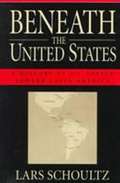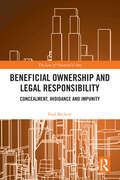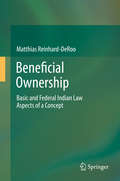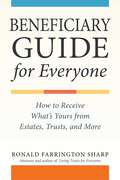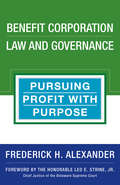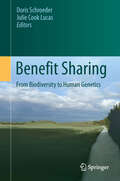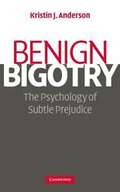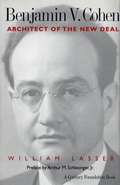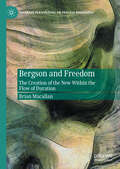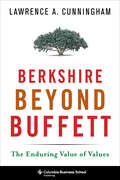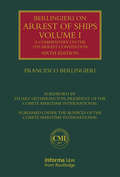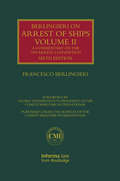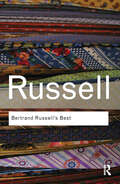- Table View
- List View
Beneath the United States: A History of U. S. Policy Toward Latin America
by Lars Schoultz<p>In this sweeping history of United States policy toward Latin America, Lars Schoultz shows that the United States has always perceived Latin America as a fundamentally inferior neighbor, unable to manage its affairs and stubbornly underdeveloped. <p>This perception of inferiority was apparent from the beginning. John Quincy Adams, who first established diplomatic relations with Latin America, believed that Hispanics were "lazy, dirty, nasty...a parcel of hogs." In the early nineteenth century, ex-President John Adams declared that any effort to implant democracy in Latin America was "as absurd as similar plans would be to establish democracies among the birds, beasts, and fishes." <p>Drawing on extraordinarily rich archival sources, Schoultz, one of the country's foremost Latin America scholars, shows how these core beliefs have not changed for two centuries. We have combined self-interest with a "civilizing mission"--a self-abnegating effort by a superior people to help a substandard civilization overcome its defects. William Howard Taft felt the way to accomplish this task was "to knock their heads together until they should maintain peace," while in 1959 CIA Director Allen Dulles warned that "the new Cuban officials had to be treated more or less like children." Schoultz shows that the policies pursued reflected these deeply held convictions. <p>While political correctness censors the expression of such sentiments today, the actions of the United States continue to assume the political and cultural inferiority of Latin America. Schoultz demonstrates that not until the United States perceives its southern neighbors as equals can it anticipate a constructive hemispheric alliance.</p>
Beneficial Ownership and Legal Responsibility: Concealment, Avoidance and Impunity (The Law of Financial Crime)
by Paul BeckettThis book explores the connection between ownership, on one hand, and immunity from legal responsibility, on the other. It presents a definition of the concept of beneficial ownership, the reasons for its concealment, and failures in international legal structures and arrangements. Globally, States confront complex criminality, such as corruption, tax evasion, doctrinal fanaticism, trafficked slaves, terrorism and, war. At the personal level, men and women may seek to escape their creditors, to disinherit unwanted heirs, to cheat divorced partners, and to appear straightforward when this is not the case. The response of politicians and regulators has been a global State initiative to identify beneficial owners via public registers to promote transparency and accountability. Yet, at the same time, there is an equally powerful global and personal counter-initiative to promote beneficial ownership avoidance. Where there is no owner, there is no accountability. This book examines what “ownership” means in legal terms across multiple legal systems and explains why singling out “ownership” as being pivotal to State and personal accountability is a strategy both flawed and disingenuous. It is argued that an apparent lack of political will coupled with shape-shifting definitions of “ownership” have resulted in tokenism. Particular attention is paid to those “orphan” structures which have evolved from standard models, or which have been designed for the purpose in each case of facilitating ownership concealment and avoidance. The author explains how the virtual world of the blockchain, crypto-assets and cryptocurrency, and virtual entities such as the Decentralised Autonomous Organisation (DAO), all of which elude legal classification, have opened a new world of possibilities. Applicable across all jurisdictions and legal systems, the book will be a valuable resource for academics, researchers, and policy-makers working in the areas of Financial Crime, Regulation, Compliance, Business, and Accountancy.
Beneficial Ownership: Basic and Federal Indian Law Aspects of a Concept
by Matthias Reinhard-DerooThe hunt for beneficial owners is on. Like an elephant, the beneficial owner hides in the jungle of complex legal structures, waiting to be discovered by eager prosecutors. But what lies behind this metaphor? What is a Beneficial Owner? Is beneficial ownership a right? What does this right encompass? What is the value of this right compared to other rights? And if beneficial ownership is not a right, is it still a legally relevant relation? How do courts, namely the U. S. Supreme Court deal with the concept? When do Anglo-American judges and European scholars resort to the concept? This book approaches these questions from two perspectives: legal fundamentals and the field of U. S. federal Indian law. Both legal theories and case law are scrutinized with the aim to find a better understanding of the basic conception and characteristics of beneficial ownership Federal Indian law has been chosen for the study of the concrete implications of the beneficial ownership concept in what Roscoe Pound referred to as "the law in action. " To some, this choice of legal field might seem somewhat unusual. What answers could federal Indian law possibly offer with regard to pressing questions from the financial industry? As always, there is a short and a long answer. The short answer is that the analysis of an equally sophisticated field of law can open new perspectives on a given field of law. For example, not only potential criminals and tax evaders but also members of an older civilization are beneficial owners. The long answer can be found in this very book.
Beneficiary Guide for Everyone: How to Receive What's Yours from Estates, Trusts, and More
by Ronald Farrington SharpLearn how to protect your rights, avoid delay or fraud, and ensure what is yours ends up in the right place. TThe primary reason people take the time to write a will or create a trust is not for their own sake. It is to be sure that the legal process for their beneficiaries is simple, quick, and fair. The goal is to reflect not just their wishes but also to be mindful of the expectations and needs of those left behind.Beneficiary Guide for Everyone is a step-by-step handbook on how to make and execute these decisions to get the maximum benefit. The first part covers the perspective of the planner: choosing how to leave your assets to your chosen beneficiaries, while simplifying complicated legal options, definitions, and concepts. The next covers how beneficiaries should approach the process so that assets are distributed with minimum delays and complications.Using clear language and avoiding legalese, author and lawyer Ronald Farrington Sharp simplifies complex topics. Chapters are supplemented with Q&A features to answer some common questions friends and clients have posed to him––and to which readers are likely to also need answers.
Benefit Corporation Law and Governance: Pursuing Profit with Purpose
by Frederick H. AlexanderCorporations with a ConscienceCorporations today are embedded in a system of shareholder primacy. Nonfinancial concerns—like worker well-being, environmental impact, and community health—are secondary to the imperative to maximize share price. Benefit corporation governance reorients corporations so that they work for the interests of all stakeholders, not just shareholders. This is the first authoritative guide to this new form of governance. It is an invaluable guide for legal and financial professionals, as well as interested entrepreneurs and investors who want to understand how purposeful corporate governance can be put into practice.
Benefit Sharing: From Biodiversity to Human Genetics
by Doris Schroeder Julie Cook LucasBiomedical research is increasingly carried out in low- and middle-income countries. International consensus has largely been achieved around the importance of valid consent and protecting research participants from harm. But what are the responsibilities of researchers and funders to share the benefits of their research with research participants and their communities? After setting out the legal, ethical and conceptual frameworks for benefit sharing, this collection analyses seven historical cases to identify the ethical and policy challenges that arise in relation to benefit sharing. A series of recommendations address possible ways forward to achieve justice for research participants in low- and middle-income countries.
Benign Bigotry: The Psychology of Subtle Prejudice
by Kristin J. AndersonWhile overt prejudice is now much less prevalent than in decades past, subtle prejudice - prejudice that is inconspicuous, indirect, and often unconscious - continues to pervade our society. Laws do not protect against subtle prejudice and, because of its covert nature, it is difficult to observe and frequently goes undetected by both perpetrator and victim. Benign Bigotry uses a fresh, original format to examine subtle prejudice by addressing six commonly held cultural myths based on assumptions that appear harmless but actually foster discrimination: 'those people all look alike'; 'they must be guilty of something'; 'feminists are man-haters'; 'gays flaunt their sexuality'; 'I'm not a racist, I'm color-blind' and 'affirmative action is reverse racism'. Kristin J. Anderson skillfully relates each of these myths to real world events, emphasizes how errors in individual thinking can affect society at large, and suggests strategies for reducing prejudice in daily life.
Benjamin V. Cohen: Architect of the New Deal
by William LasserThis is a biography of Benjamin V. Cohen focusing on the "New Deal" giant.
Benjamin and Brecht: The Story of a Friendship
by Christine Shuttleworth Erdmut WizislaA fascinating account of the friendship between two of the most brilliant minds of the twentieth centuryGermany in the mid 1920s, a place and time of looming turmoil, brought together Walter Benjamin--acclaimed critic and extraordinary literary theorist--and Bertolt Brecht, one of the twentieth century's most influential playwrights. It was a friendship that would shape their writing for the rest of their lives.In this groundbreaking work, Erdmut Wizisla explores what this relationship meant for them personally and professionally, as well as the effect it had on those around them. From the first meeting between Benjamin and Brecht to their experiences in exile, these eventful lives are illuminated by personal correspondence, journal entries and private miscellany--including previously unpublished materials--detailing the friends' electric discussions of their collaboration. Wizisla delves into the archives of other luminaries in the distinguished constellation of writers and artists in Weimar Germany, which included Margarete Steffin, Theodor Adorno, Ernst Bloch and Hannah Arendt. Wizisla's account of this friendship opens a window on nearly two decades of European intellectual life.From the Trade Paperback edition.
Bent Coppers
by Graeme McLaganThe inside story of a secret unit that has worked under cover to expose corruption in the Metropolitan Police since the early 1990s.'If you want a book that is genuinely 'unputdownable' read BENT COPPERS' Johnny Vaughan, THE SUN'A very engaging read - the outrageous nature of bent cops' behaviour guarantees that' SUNDAY TELEGRAPHShocked by the extent of corruption within its ranks, Scotland Yard set up a new anti-corruption unit in the early 1990s. Its members had to operate in conditions of unprecedented secrecy and they became known as the 'Ghost Squad'.Bent Coppers really did believe they were untouchable: they stole cash and property, fitted-up innocent people and sold secret information to cripple court cases. Many of the bent coppers are now in jail or awaiting trial but the battle against corruption is not over.Only now can the story of the 'Ghost Squad' be revealed. Award-winning BBC home affairs correspondent Graeme McLagan had followed the investigation since the beginning. He has interviewed undercover officers and many of the bent coppers they have exposed. this is the inside story of the 'Ghost Squad' and how it broke into the secret world of police corruption.
Bentham on Democracy, Courts, and Codification
by Philip Schofield Xiaobo ZhaiDrawing upon original manuscripts and The Collected Works of Jeremy Bentham, this collection represents the latest scholarship on Bentham's late and mature thought on constitutional law. The contributions cover a diverse range of major topics, from official aptitude or competency to the interests of women, and explore Bentham's writings on courts, codification, and cosmopolitanism. Together, its chapters challenge the received notion, based on early jurisprudential writings, that Bentham's constitutional thought is authoritarian, and show that Bentham, as a constitutional theorist, offers a distinctive liberal perspective. Freeing Bentham's theories from their long sentences and unfamiliar terminology, these essays make accessible Bentham's subtle and important ideas on liberal democracy. By shining a light on Bentham's mature thought, this volume offers a refreshingly comprehensive, detailed, and authentic account of Bentham's theory of democracy.
Bentham's Theory of Law and Public Opinion
by Xiaobo Zhai Michael QuinnThis collection represents the latest research from leading scholars whose work has helped to frame our understanding of Bentham since the publication of H. L. A. Hart's Essays on Bentham. The authors explore fundamental areas of Bentham's thought, including the relationship between the rule of law and public opinion; law and popular prejudices or manipulated tastes; Bentham's methodology versus Hart's; sovereignty and codification; and the language of natural rights. Drawing on original manuscripts and volumes in The Collected Works of Jeremy Bentham, the chapters combine philosophical and historical approaches and offer new and more faithful interpretations of Bentham's legal philosophy and its development. As a coherent whole, the book challenges the dominant understandings of Bentham among legal philosophers and rescues him from some famous mischaracterizations.
Bento's Sketchbook
by John BergerA deeply moving exploration of the relationship between thinking and drawing, from the author of the groundbreaking Ways of SeeingThe seventeenth-century philosopher Baruch Spinoza (a.k.a. Bento) spent the most intense years of his short life writing. He also carried with him a sketchbook. After his sudden death, his friends rescued letters, manuscripts, notes—but no drawings.For years, without knowing what its pages might hold, John Berger has imagined finding Bento&’s sketchbook, wanting to see the drawings alongside his surviving words. When one day a friend gave him a beautiful virgin sketchbook, Berger said, &‘This is Bento&’s!&’ and he began to draw, taking inspiration from the philosopher&’s vision.In this beautifully illustrated book, Berger uses the imaginative space opened up in this experiment to explore politics, storytelling, Spinoza&’s life and times, and the process of drawing itself.
Beratung, Organisation und Vertragsgestaltung nach dem Honorar-Anlageberatungsgesetz (Bibliothek des Bank- und Kapitalmarktrechts #4)
by Lea SpiegelbergUnter Berücksichtigung der europäischen Vorgaben erläutert dieses Buch die Auswirkungen des Honorar-Anlageberatungsgesetzes auf die aufsichtsrechtlichen und zivilrechtlichen Anforderungen an eine ordnungsgemäße Honorar-Anlageberatung. Die europäische Finanzmarktrichtlinie MiFID II verfolgt unter anderem die Stärkung der unabhängigen Anlageberatung. Der deutsche Gesetzgeber hat bereits im Jahr 2014 darauf reagiert und das Honorar-Anlageberatungsgesetz verabschiedet, das zu einer Stärkung und Etablierung der unabhängigen Anlageberatung dienen soll. Denn die provisionsbasierte Anlageberatung hat in der Vergangenheit oft zu Falschberatungen der Anleger geführt. Vor diesem Hintergrund befasst sich das Buch ausführlich mit den neuen aufsichtsrechtlichen Anforderungen an die Honorar-Anlageberatung. Zudem werden die vertraglichen Pflichten der Parteien des Honorar-Anlageberatungsvertrages umfassend untersucht und die Ausgestaltungsmöglichkeiten des Honoraranspruches dargestellt.
Beratungs- und Haftungsrisiken in der Unternehmenskrise: Risikomanagement für Steuerberater und Rechtsanwälte
by Raik Brete Michael ThomsenDie Tätigkeit als Steuerberater oder Rechtsanwalt stellt hohe Anforderungen an den Berater und bringt erhebliche Pflichten mit sich. Daher ist das damit einhergehende Haftungspotenzial nicht zu unterschätzen, sowohl in der täglichen Beratung, als insbesondere auch im Krisenmandat. Dieser Leitfaden sensibilisiert den Berater für die Haftungsgefahren im Krisenmandat und zeigt Wege zur Risikominimierung auf. Die 2. Auflage berücksichtigt die jüngste BGH-Rechtsprechung und geht auf die gesteigerten Aufklärungs- und Hinweispflichten ein.
Bereicherungsrecht (Springer-Lehrbuch)
by Hans Josef Wieling Thomas FinkenauerDas Bereicherungsrecht zählt zu den undurchsichtigsten und schwierigsten Kapiteln des Schuldrechts, hat dabei aber erhebliche Examensrelevanz. Die Neuauflage arbeitet die tragenden Grundgedanken des Kondiktionenrechts deduktiv heraus und entwickelt daraus die für das Verständnis relevanten Grundsätze. Sie gibt Studenten eine Orientierungshilfe und ermöglicht es ihnen, sich mit überschaubarem Aufwand auf Klausuren und mündliche Prüfungen vorzubereiten. Im Interesse der Übersichtlichkeit und Klarheit verzichtet sie auf eine breite Darstellung des Literaturstreites. Aktualisiert und dem neuesten Stand der Rechtsprechung und Literatur angepasst.
Bereicherungsrecht (Springer-Lehrbuch)
by Hans Josef Wieling Thomas FinkenauerDas Bereicherungsrecht zählt traditionell zu den undurchsichtigsten und schwierigsten Kapiteln des Schuldrechts, hat dabei aber erhebliche Examensrelevanz. Das Buch arbeitet die tragenden Grundgedanken des Kondiktionenrechts heraus und entwickelt daraus die für das Verständnis der Materie relevanten Grundsätze. Sein Ziel ist es, Studenten eine Orientierungshilfe zu geben und es ihnen zu ermöglichen, sich mit überschaubarem Aufwand auf Klausuren und mündliche Prüfungen in den Examina vorzubereiten. Die Neuauflage wurde aktualisiert, neue Gesetzgebung wie die Reform des Betreuungsrechts und Rechtsprechung wurden eingearbeitet.
Bergson and Freedom: The Creation of the New Within the Flow of Duration (Palgrave Perspectives on Process Philosophy)
by Brian MacallanThis book provides the first full length treatment of the nature and function of freedom within the work of Henri Bergson. It does so while also introducing Bergson’s key ideas and major works. It explores Bergson through the lens of freedom, while at the same time showing how Bergson’s work might engage with current challenges. It does this by examining the four major works of Bergson, highlighting how freedom can be conceived in each text and how Bergson addresses key freedom problematics in those works. It offers a definition of freedom in Bergson as the “creation of the new within the flow of duration.” What emerges, is that freedom remains crucial for Bergson beyond the obvious treatment of freedom directly in Time and Free Will. Free will, memory, evolution, religion, and morality are major themes for Bergson. Moreover, there are particular freedom problematics concerning each of those themes that illustrate the central importance of freedom in Bergson. These include determinism, dualism, materialism, mechanism, finalism, and the notion of the open and closed.
Berkshire Beyond Buffett: The Enduring Value of Values (Columbia Business School Publishing)
by Lawrence CunninghamBerkshire Hathaway, the $300 billion conglomerate that Warren Buffett built, is among the world's largest and most famous corporations. Yet, for all its power and celebrity, few people understand Berkshire, and many assume it cannot survive without Buffett. This book proves them wrong. In a comprehensive portrait of the corporate culture that unites Berkshire's subsidiaries, Lawrence A. Cunningham unearths the traits that assure the conglomerate's continued prosperity. Riveting stories of each subsidiary's origins, triumphs, and journey to Berkshire reveal how managers generate economic value from intangibles like thrift, integrity, entrepreneurship, autonomy, and a sense of permanence. Rich with lessons for those wishing to profit from the Berkshire model, this engaging book is a valuable read for entrepreneurs, business owners, managers, family business members, and investors, and it is an important resource for scholars of corporate stewardship. General readers will enjoy learning how an iconoclastic businessman transformed a struggling textile company into a corporate legacy.
Berlingieri on Arrest of Ships Volume I: A Commentary on the 1952 Arrest Convention (Lloyd's Shipping Law Library)
by Francesco BerlingieriNow presented in two convenient volumes, the sixth edition of Berlingieri on Arrest of Ships is an invaluable source of information, detailing the claims in respect of which a ship may be arrested, the conditions for obtaining an order of arrest, the need for a security, the manner by which the ship that has been arrested may be released, the possibility of a multiple arrest and the jurisdiction on the merits. Focused on the 1952 Arrest Convention, volume I provides a unique, thorough, and updated commentary, analysing each provision with reference to its interpretation in a significant number of States Parties. Moreover, the original comments have been reviewed on the basis of the Travaux Préparatoires of the Convention, which the Author has collected and arranged under each article. In addition to this, the Travaux Préparatoires are now included as a new and important appendix to the volume. Written by a renowned expert in the field, and analysing the various conventions relating to the arrest of ships in an article-by-article and paragraph manner, this book is a useful reference tool for practitioners, as well as academics and post-graduate students of maritime law.
Berlingieri on Arrest of Ships Volume II: A Commentary on the 1999 Arrest Convention (Lloyd's Shipping Law Library)
by Francesco BerlingieriNow presented in two convenient volumes, the sixth edition of Berlingieri on Arrest of Ships is an invaluable source of information, detailing the claims in respect of which a ship may be arrested, the conditions for obtaining an order of arrest, the need for a security, the manner by which the ship that has been arrested may be released, the possibility of a multiple arrest and the jurisdiction on the merits. Focused on the 1999 Arrest Convention, volume II provides a unique, thorough, and updated commentary, analysing each provision with reference to its interpretation in a significant number of States Parties. Moreover, the original comments have been reviewed on the basis of the Travaux Préparatoires of the Convention, which the Author has collected and arranged under each article. In addition to this, the Travaux Préparatoires are now included as a new and important appendix to the volume. Written by a renowned expert in the field, and analysing the various conventions relating to the arrest of ships in an article-by-article and paragraph manner, this book is a useful reference tool for practitioners, as well as academics and post-graduate students of maritime law.
Bertrand Russell's Best (Routledge Classics Ser.)
by Bertrand RussellBertrand Russell is regarded as one of the twentieth century’s greatest minds. Well-known for his profound knowledge and controversial approach to myriad of different issues and subjects such as sex, marriage, religion, education and politics, his prolific works also exhibit great intellectual wit and humour. First published in 1958, Bertrand Russell’s Best is a delightfully funny and entertaining book, and a striking testament to the remarkable life work and wit of Bertrand Russell.
Beschränkungen des Internetvertriebs aus kartellrechtlicher Sicht
by Alexander FuchsBeschränkungen des Internetvertriebs stellen aufgrund der hohen wirtschaftlichen Bedeutung des Onlinehandels oftmals eine starke Beeinträchtigung für den Wettbewerb dar. In vielen Bereichen verlaufen die Interessen von Herstellern und Händlern inkongruent. Vor diesem Hintergrund befasste sich der Autor mit der Frage, inwieweit Hersteller den Internetvertrieb im Vertikalverhältnis einschränken können und Einfluss auf die konkrete Ausgestaltung des Vertriebs nehmen können. In diesem Zusammenhang analysierte der Autor die Vereinbarkeit von herstellerseitigen Vertriebsvorgaben – insbesondere unter dem Blickwinkel des Selektivvertriebs – auf ihre Vereinbarkeit mit Art. 101 AEUV. Der Band zeigt zudem auf, inwieweit Qualitätsvorgaben an den Internetvertrieb mit denen an den stationären Handel gleichlaufen müssen. Weiter stellt das Buch heraus, dass die Kriterien der Metro-Rechtsprechung auch auf den heutigen Internetvertrieb Anwendung finden. Auch wird festgestellt, dass ein Produktimage ein mit Art. 101 AEUV vereinbares selektives Vertriebssystem bedingen kann, sowohl aufgrund eines Luxusimages als auch aufgrund eines hochwertigen Markenimages.
Beschäftigung von Flüchtlingen: Arbeits- und Ausbildungsverhältnisse rechtskonform gestalten (essentials)
by Christoph GyoDas essential gibt einen Überblick über die unterschiedlichen Aufenthaltstitel und -statuten sowie über die Auswirkungen dieser Differenzierungen auf die Beschäftigung von Flüchtlingen. Es werden mögliche Problemfelder in den jeweiligen Phasen eines Beschäftigungsverhältnisses aufgezeigt und die arbeitsrechtlichen Instrumente zur ihrer praxisorientierten Handhabung vorgestellt. Soweit es bei der Beschäftigung von Flüchtlingen zu sozialversicherungs- und steuerrechtlichen Besonderheiten kommt, werden diese beleuchtet. Für die zweite Auflage wurden insbesondere die Neuerungen des Integrationsgesetzes eingearbeitet sowie die Informationen zu den Fördermöglichkeiten der Flüchtlingsbeschäftigung vertieft.
Beschäftigung von Flüchtlingen: Arbeits- und Ausbildungsverhältnisse rechtskonform gestalten (essentials)
by Christoph GyoDas essential gibt einen Überblick über die unterschiedlichen Aufenthaltstitel und -statuten sowie über die Auswirkungen dieser Differenzierungen auf die Beschäftigung von Flüchtlingen. Es werden mögliche Problemfelder in den jeweiligen Phasen eines Beschäftigungsverhältnisses aufgezeigt und die arbeitsrechtlichen Instrumente zur ihrer praxisorientierten Handhabung vorgestellt. Soweit es bei der Beschäftigung von Flüchtlingen zu sozialversicherungs- und steuerrechtlichen Besonderheiten kommt, werden diese beleuchtet. Für die dritte Auflage wurden insbesondere die Neuerungen des Fachkräfteeinwanderungsgesetzes und der Ukraine-Aufenthalts-Übergangsverordnung eingearbeitet sowie die Informationen zu den Fördermöglichkeiten der Flüchtlingsbeschäftigung vertieft.
